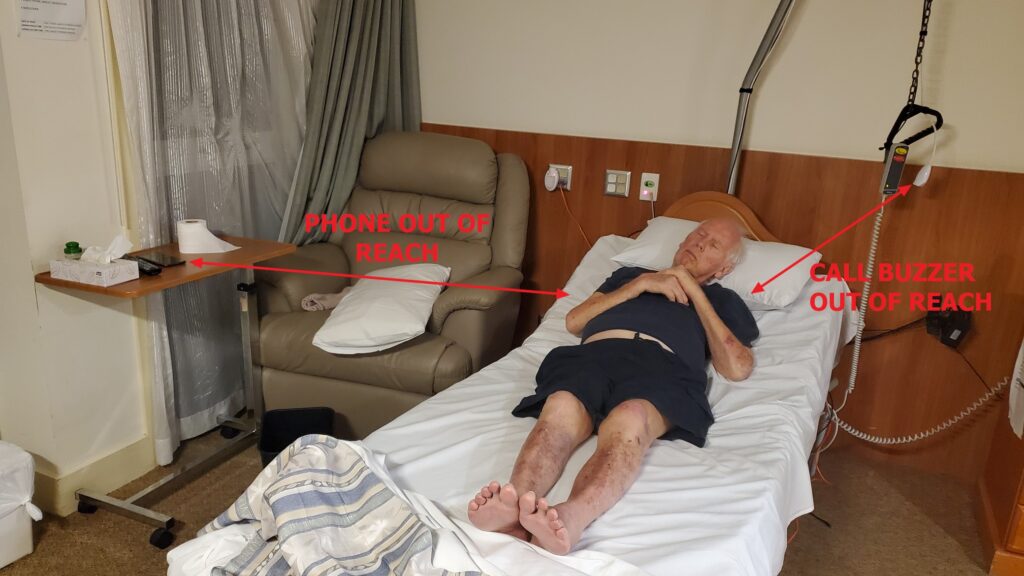Calls to his mobile phone are an increasingly unreliable means of contact/communication. This is due to a combination of factors, some of which we have little control over. Factors include (but are not limited to) Dad’s inevitable decline, his aging mobile phone and inconsistent support from some staff.
NOBODY SHOULD ‘PUT ALL THIER EGGS IN THIS BASKET’.
There are a number of reasons Dad may not answer his phone at all. These include (but are not limited to):
- His phone is out of reach. This frequently happens when staff move it out of the way during feeding, transfers, cleaning, etc. – and forget to put it back.
- He is having trouble using the touchscreen. This is usually because of tremors, poor motor function or unexpected screens popping up on his phone.
- He is trying to swipe the ‘answer’ button (the old way) as opposed to pressing the ‘answer’ button (the way his seniors’ app works)
- He is not in his room and doesn’t have his phone with him.
- He has accidentally lowered or muted the ring volume and doesn’t realise anybody is calling.
- His battery is flat, and neither he nor the staff are aware of it.
- Poor mobile reception. Sometimes, you can walk from one side of the room to the other and lose 50% of the signal. In the hallway outside his room, I can hardly get a signal at all. Whether you can through to him can literally depend on what side of his bed the staff have placed his phone on that day.
- He is trying to answer the call with his TV remote. Sometimes, he picks up the wrong device from his bedside table and doesn’t realise it until long after the call has rung out.
- Staff are attending to him. Changing his pad, getting him dressed, feeding him, administering medication, etc
The photo below shows how his phone is sometimes out of reach …

The following video shows that …
- Dad often misses calls.
- It’s not just Micheal who has trouble phoning Dad.
- He gets a relatively low mobile phone signal.
- No family members have been added to the phone’s blocked numbers.
- Very few people are even trying to ring him.
- Some of the people who are ringing him are giving up too soon.
Even if he answers the phone, there are a number of reasons why you may still have difficulty communicating with him. These include (but are not limited to):
- He is mumbling, speaking softly, having trouble with names and words, feeling confused/disoriented or feeling sleepy. Some days are better than others, but these are nonetheless common symptoms of Parkinson’s and dementia.
- You have just woken him from a nap. Dad sleeps a lot during the day. Sometimes, he becomes alert quickly. Other times, it can take 10-20 minutes.
- One moment, he is holding his phone to his mouth; the next moment, he holds it too far away for you to hear him clearly. This is usually because…
- He is distracted with something else, or
- His arm is getting tired from holding the phone up to his ear or
- He thinks the speakerphone is turned on when it is not.
- He is accidentally pressing buttons (hold, hangup, reject call, etc). This is usually due to tremors, poor hand-eye coordination, or how he is holding his phone.
- He is holding his phone the wrong way around – or even upside down. This makes it even harder to hear him and harder for him to hear you.
- He thinks the call has ended/dropped out when it has not.
- He has accidentally lowered his in-call volume. To avoid accidentally pressing the touchscreen, he will hold the phone at its edges. Unfortunately, the volume keys are located on the edge of his phone.
- The noise from his TV is drowning out his or your voice.
